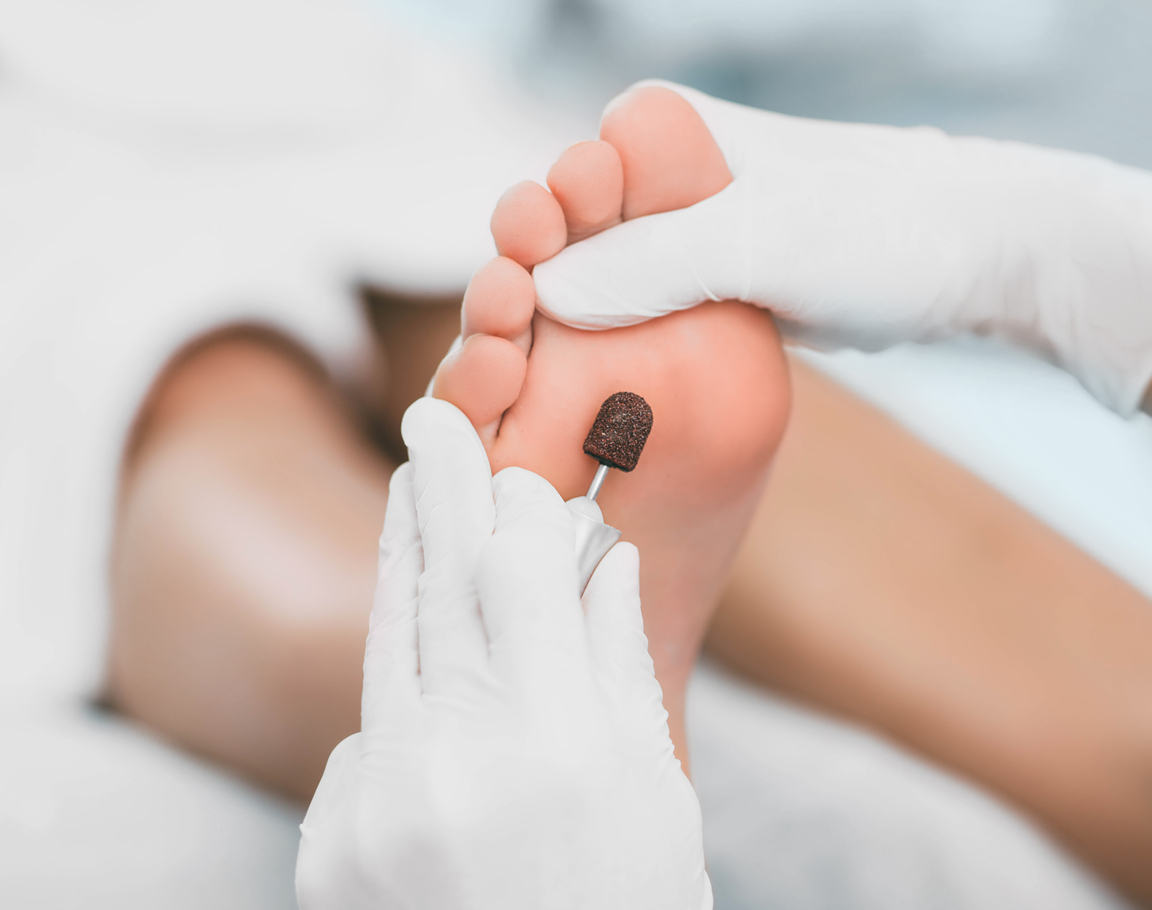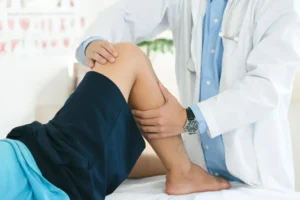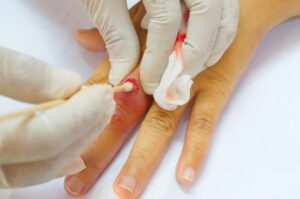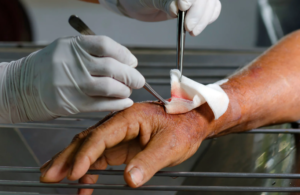Diabetic foot wounds are one of the most common—and dangerous—complications for individuals living with diabetes. When wounds fail to heal properly, they can lead to serious infections, long-term disability, and even amputation. These risks are magnified by poor circulation and peripheral neuropathy, both of which are prevalent among diabetic patients. That’s why early and specialized orthopedic care is crucial.
Orthopedic treatment for foot wounds that won’t heal in diabetes offers a targeted, comprehensive approach to wound management. By addressing both the immediate injury and the underlying biomechanical issues, orthopedic specialists help patients regain mobility while reducing the likelihood of life-threatening complications.
Understanding the Link Between Diabetes and Foot Wounds
Diabetes mellitus impairs the body’s ability to regulate blood sugar, but its effects go far beyond glucose levels. Long-term diabetes can result in peripheral neuropathy (nerve damage) and peripheral artery disease (poor blood circulation), especially in the lower limbs. These conditions work in tandem to create a perfect storm: patients may not feel pain or injury in their feet, and their bodies struggle to deliver enough blood to facilitate healing.
This is why foot wounds in diabetic individuals are often slow to heal or don’t heal at all. Small cuts or blisters can quickly progress to chronic ulcers, especially if left untreated. According to the International Diabetes Federation, up to 25% of diabetics will develop a foot ulcer in their lifetime. Without proper intervention, these ulcers may lead to serious infections or require surgical removal of tissue or limbs.
Why Diabetic Foot Wounds Require Specialized Orthopedic Treatment
Traditional wound care often falls short when it comes to managing diabetic foot wounds. Orthopedic treatment for foot wounds that won’t heal in diabetes goes beyond surface-level care by focusing on the structural and functional aspects of the foot and lower limbs.
When foot structure is compromised—whether due to deformity, pressure points, or gait abnormalities—it becomes difficult for wounds to close and remain healed. Orthopedic specialists are trained to assess these factors and offer targeted solutions. Their intervention minimizes the mechanical forces that contribute to tissue breakdown while supporting proper healing.
Moreover, orthopedic care incorporates strategies for infection prevention, which is especially important for diabetic patients who have a reduced ability to fight off bacteria. From proper footwear to surgical procedures, orthopedic specialists provide an essential layer of defense.
Core Principles of Orthopedic Care for Diabetic Foot Wounds
Orthopedic treatment for foot wounds that won’t heal in diabetes involves several core principles, each designed to enhance healing while preserving the integrity of the limb.
Wound Offloading and Pressure Relief: Excess pressure on a wound site significantly delays healing. Orthopedic care emphasizes the use of custom orthotics, braces, and walking aids to redistribute weight and reduce stress on vulnerable areas. Techniques like total contact casting are often used to protect the wound while allowing the patient to remain mobile.
Infection Prevention and Tissue Preservation: Timely debridement (removal of dead tissue), sterile dressings, and antibiotics may be combined with orthopedic techniques to stop infections before they spread. By preserving as much healthy tissue as possible, orthopedic care reduces the likelihood of more invasive procedures.
Bracing and Orthotic Solutions: Orthotic devices correct gait abnormalities, provide arch support, and stabilize the foot to prevent additional trauma. These customized tools are essential for long-term wound management and prevention of recurrence.
Enhancing Mobility Safely: Maintaining mobility is vital for overall health, but in the presence of a foot wound, it must be done cautiously. Orthopedic treatment ensures that patients can walk or stand without worsening their injury, thanks to biomechanically sound supports and treatment protocols.
Advanced Orthopedic Techniques to Promote Healing
Orthopedic specialists have access to advanced tools and techniques that enhance the healing process for diabetic foot wounds.
Specialized Diabetic Footwear: Shoes designed specifically for diabetic patients offer extra depth, cushioning, and minimal internal seams to reduce friction and pressure. These shoes are often prescribed as part of a comprehensive orthopedic treatment plan.
Surgical Options: For some patients, surgery may be necessary to remove infected or necrotic tissue, correct deformities, or improve circulation. Orthopedic surgeons can perform procedures such as tendon lengthening, bone reshaping, or minor amputations to create a more stable and functional foot structure.
Bioengineered Tissue and Dressings:New materials such as synthetic skin grafts, collagen matrices, and antimicrobial dressings are often integrated into orthopedic treatment plans. These technologies provide a favorable environment for tissue regeneration and minimize the risk of infection.
Tec Orthopedics: Comprehensive Diabetic Wound Care
Tec Orthopedics delivers a holistic and patient-centered approach to orthopedic treatment for foot wounds that won’t heal in diabetes. With a focus on preserving mobility and preventing complications, their specialized services cater to the unique needs of diabetic patients.
By bringing together a multidisciplinary team—including orthopedic surgeons, podiatrists, physical therapists, and wound care specialists—Tec Orthopedics offers seamless care from diagnosis to recovery. Every patient receives a personalized treatment plan that combines medical management, biomechanical correction, and lifestyle recommendations.
What sets Tec Orthopedics apart is its commitment to long-term success. Treatment doesn’t end once a wound closes; patients are guided through rehabilitation and follow-up strategies to prevent recurrence and maintain their independence.
Preventing Future Foot Wounds Through Proactive Orthopedic Management
While orthopedic treatment for foot wounds that won’t heal in diabetes is essential, prevention remains the best approach. Through regular orthopedic check-ups and proactive management strategies, patients can avoid wounds altogether.
Routine Foot Assessments: Regular screenings help detect pressure points, deformities, or early signs of injury before they evolve into open wounds. Tec Orthopedics provides thorough assessments using diagnostic tools and visual inspections.
Education on Foot Hygiene and Protection: Patients are taught how to wash, inspect, and moisturize their feet properly, as well as how to avoid trauma and pressure that can lead to ulcers.
Early Intervention: At the first sign of redness, swelling, or unusual foot pain, patients are encouraged to seek orthopedic evaluation. Early action can significantly reduce the risk of complications.
When to See an Orthopedic Specialist
Recognizing the signs of a problematic foot wound can be lifesaving. If a wound has not improved after a week of standard care, or if there are signs of infection (pus, foul odor, warmth, redness, or increasing pain), it’s time to consult an orthopedic specialist.
Other warning signs include:
- Numbness or tingling in the feet
- Changes in foot shape or arch collapse
- Visible foot deformities
- Discoloration or darkening of the wound area
- Wound drainage that won’t stop
An orthopedic consultation typically involves a physical exam, diagnostic imaging (X-rays or vascular studies), and biomechanical assessments. From there, a tailored treatment plan is developed to ensure optimal healing and limb preservation.
Takeaway
Orthopedic treatment for foot wounds that won’t heal in diabetes is not just about wound closure—it’s about restoring quality of life, maintaining mobility, and preventing future complications. With expert care from providers like Tec Orthopedics, patients gain access to advanced therapies and compassionate support that make a real difference.
For those living with diabetes, every step matters. Investing in specialized orthopedic care can mean the difference between chronic suffering and a healthier, more active future. If you or someone you love is struggling with a non-healing foot wound, don’t wait. Reach out to a trusted orthopedic provider and take the first step toward healing today.






